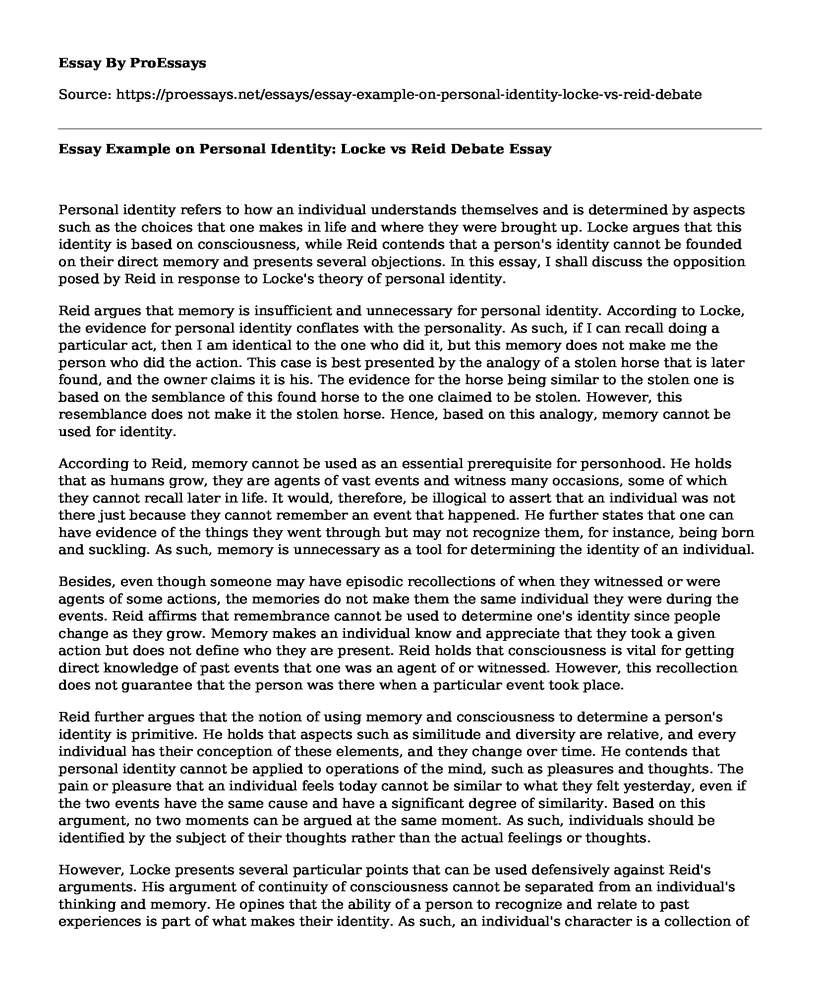Personal identity refers to how an individual understands themselves and is determined by aspects such as the choices that one makes in life and where they were brought up. Locke argues that this identity is based on consciousness, while Reid contends that a person's identity cannot be founded on their direct memory and presents several objections. In this essay, I shall discuss the opposition posed by Reid in response to Locke's theory of personal identity.
Reid argues that memory is insufficient and unnecessary for personal identity. According to Locke, the evidence for personal identity conflates with the personality. As such, if I can recall doing a particular act, then I am identical to the one who did it, but this memory does not make me the person who did the action. This case is best presented by the analogy of a stolen horse that is later found, and the owner claims it is his. The evidence for the horse being similar to the stolen one is based on the semblance of this found horse to the one claimed to be stolen. However, this resemblance does not make it the stolen horse. Hence, based on this analogy, memory cannot be used for identity.
According to Reid, memory cannot be used as an essential prerequisite for personhood. He holds that as humans grow, they are agents of vast events and witness many occasions, some of which they cannot recall later in life. It would, therefore, be illogical to assert that an individual was not there just because they cannot remember an event that happened. He further states that one can have evidence of the things they went through but may not recognize them, for instance, being born and suckling. As such, memory is unnecessary as a tool for determining the identity of an individual.
Besides, even though someone may have episodic recollections of when they witnessed or were agents of some actions, the memories do not make them the same individual they were during the events. Reid affirms that remembrance cannot be used to determine one's identity since people change as they grow. Memory makes an individual know and appreciate that they took a given action but does not define who they are present. Reid holds that consciousness is vital for getting direct knowledge of past events that one was an agent of or witnessed. However, this recollection does not guarantee that the person was there when a particular event took place.
Reid further argues that the notion of using memory and consciousness to determine a person's identity is primitive. He holds that aspects such as similitude and diversity are relative, and every individual has their conception of these elements, and they change over time. He contends that personal identity cannot be applied to operations of the mind, such as pleasures and thoughts. The pain or pleasure that an individual feels today cannot be similar to what they felt yesterday, even if the two events have the same cause and have a significant degree of similarity. Based on this argument, no two moments can be argued at the same moment. As such, individuals should be identified by the subject of their thoughts rather than the actual feelings or thoughts.
However, Locke presents several particular points that can be used defensively against Reid's arguments. His argument of continuity of consciousness cannot be separated from an individual's thinking and memory. He opines that the ability of a person to recognize and relate to past experiences is part of what makes their identity. As such, an individual's character is a collection of their experiences that unify their current self and encounters, hence making the present person. As such, the episodic recollections of an individual may impact their current status and thus determine their identity.
Besides, according to Locke, identity is based on what an individual stands for since humans are intelligent beings with reason and reflection. He asserts that humans think reflectively, and their thoughts suffice over time. He further acknowledges that people are thinking beings at different times and places and are held accountable for their actions. Therefore, their identity is founded on how they feel and the consequences expected for various acts. Furthermore, consciousness determines how individuals perceive things and how they react to them and thus determines their identity.
Conclusion
I think Locke could respond to the objections by emphasizing on the subject of consciousness. Humans are conscious of the various actions they are involved in, and their experiences shape who they become in the future and how they perceive things. As such, memory plays an integral role in determining personal identity. Besides, consciousness informs one of the consequences of particular actions and influences how one reacts to specific events. Humans are intelligent beings, and this aspect helps them to deduce the reward or punishment to get from a particular action. Therefore, cognizance contributes significantly to defining one's identity. Overall, I think this defense would be satisfactory as it shows the role of memory in determining the identity of an individual.
Cite this page
Essay Example on Personal Identity: Locke vs Reid Debate. (2023, May 03). Retrieved from https://proessays.net/essays/essay-example-on-personal-identity-locke-vs-reid-debate
If you are the original author of this essay and no longer wish to have it published on the ProEssays website, please click below to request its removal:
- Paper on Religion Issue: Identity and Ethics of Ministers
- Theories of Personality Essay Example
- Cultural History and Values Paper Example
- Essay on the Question of Human Intelligence: The Causes of Controversy
- CIOs: Be Familiar With 4 Unethical AI Issues - Essay Sample
- Essay Example on Ethical Principles: Business Operations in a Changing Society
- Paper Example on Controlling Information: Ethics, Data Protection, and Access Monitoring







